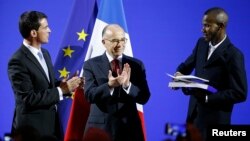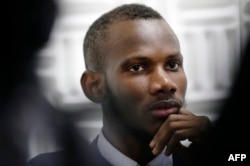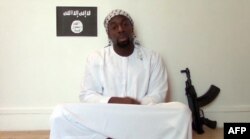A hero has emerged from this month's terrorist attacks in Paris. Malian immigrant Lassana Bathily risked his life to save people during an assault on a kosher supermarket. This week, he realized his dream of becoming a French citizen.
By coincidence, the assailant was, like Bathily, a Muslim from a Malian family. But the men present two very different faces of Islam and of immigration in France.
Bathily immigrated to France at the age of 16 and applied for citizenship several years ago. On Tuesday night, he got it during a high-level ceremony in Paris.
Prime Minister Manuel Valls handed Bathily his new French passport and saluted him for his courage in saving customers during a gunman’s siege of a Paris kosher supermarket January 9. Amedy Coulibaly, 32, took roughly 20 hostages; he killed four before he was shot dead in a police raid.
During the hours-long standoff, Bathily, who worked at the market, hid people in a cold storage room. "They were screaming and I calmed them down," he told VOA.
As France emerges from its deadliest terrorist attacks in decades, Bathily is the country's hero. More than 300,000 people signed an online petition to grant him legal status, and his application was fast-tracked. And France’s president phoned to thank him for his bravery.
"Francois Hollande called me last time," Bathily said. "He congratulated me for my action. He promised he would give me citizenship."
At the ceremony fulfilling that pledge, Interior Minister Bernard Cazeneuve called the young man a symbol of a peaceful and tolerant Islam.
In an interview with VOA, the young Muslim from Mali said he wasn't focused on the religion of the people he rescued.
"They can be Jews. It has got nothing to do with faith. You can follow a religion or not," Bathily said. "... They are innocent. They haven't done anything."
"I'm not a hero; I'm just Lassana," Bathily said. "... My story is the same as many immigrants in France."
Neighbors express pride
Not so long ago, Bathily made his home at the Saint Just hostel, a grim cement building sandwiched between a football field and a highway. Residents pick their way through a construction site to reach it. Inside, the smell of cooking and the sound of laughter hang in the warm air. Outside, a tea kettle simmers on a charcoal fire.
The dozens of African workers living in its tiny, rundown rooms are proud of Bathily. Many also come from Mali.
"We're really happy," said one man. He explained that France intervened in Mali to rout Islamists in 2013. Now, a Malian has saved a Frenchman.
Members of Bathily's family still live at Saint Just. Others, like cousin Abdoulaye Bathily, drop over to visit.
Abdoulaye Bathily said Lassana is a hard worker: "Ever since he came to France, he is someone who has not stopped working and enrolling in training programs to get ahead."
Lassana Bathily ended up working at a kosher supermarket. When jihadist Coulibaly attacked the store, Bathily hid Jewish customers – and sneaked out to inform police.
Encouraged to lend aid
Uncle Moussa Bathily applauded Lassana's actions.
"Helping others is part of Islam," he said. "Islamists are twisting the religion to do all kinds of bad things."
Moussa Bathily, a construction worker, arrived in France in 1993. He said living in France is difficult. But immigrants like himself need to succeed because they have to help family back home.
Gunman chose different route
Coulibaly, the kosher supermarket assailant, also was born to a Muslim family from Mali. He grew up in the French suburbs and became a small-time criminal. He spent time in prison and turned into an Islamist radical.
From his office across Paris, sociologist Michel Wieviorka considered these two very different paths.
One man, Bathily, "found a good path in order to become a French citizen … not assimilated, but integrated," he said. The other, Coulibaly, "was a man who did not find his place in French society. He was not so good at school. He had a personality [that] was not so easy. But he could have found his place."
Like Coulibaly, many ethnic immigrants here have not found their place. In tough suburbs, young people did not join the "I am Charlie" movement against extremism. The attack in the market and against the Charlie Hebdo satirical magazine’s staff two days earlier have sparked soul-searching about a broken social system.
"Of course, after this terrorist attack, there was a lot of emotion," Wieviorka said. "Everybody wanted to live with everybody [in unity]. So big protest, all together, national unity and so on.
"But today, a few days after, we all know that big debates are now going to begin," he continued. "And all the problems that made terrorism are still here."
Calls for a different approach
Baidy Drame agrees. General secretary of an umbrella organization of Malian immigrant groups, he said there needs to be a different approach to reaching kids who come from immigrant backgrounds and who are on the wrong path. That is what his organization is doing: trying to guide them so they won't end up delinquents.
The French government has announced a series of measures to combat terrorism and to promote integration. Will they produce a new generation of Lassana Bathilys? Many French and immigrants here are not so sure.
Kadiatou Traoré of VOA’s Bambara service contributed to this report.






